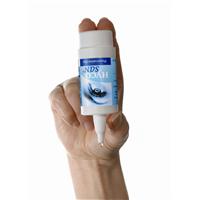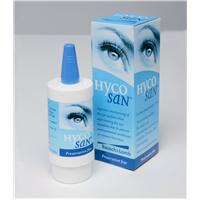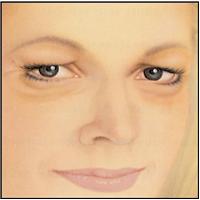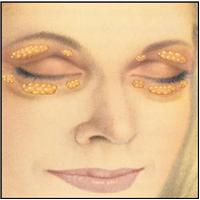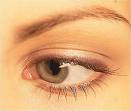
London: Eye doctors today warned that the craze for eyelash extensions may cause permanent lash damage.
False eyelashes have been around for years, and while they are more popular than ever, a new craze for semi-permanent eyelash extensions is also emerging thanks to celebrity fans like Cheryl Cole.
Yet while there is a growing trend for long, luscious lashes, eye experts at the College of Optometrists are warning women not to put fashion before their eye health when choosing to embrace the Cheryl look.
Unlike false eyelashes, where synthetic lashes are applied to the eyelid and then removed after usage, eyelash extensions are applied directly to the natural eyelash with a bonding agent and can last up to six weeks. These bonding agents and glues are irritants and can cause discomfort and potential eye damage in severe cases.
Repeated use of eyelash extensions can cause Traction Alopecia, a condition where the hair falls out due to excessive tension placed on the hair shaft. As a result this can damage the hair follicle which can slow down and even cease production of hair.
Dr Susan Blakeney, optometric advisor at the College of Optometrists said: Our eyelashes play an extremely important role in keeping our eyes healthy and act as a natural defence against dust, dirt and sunlight. While many of us covet long lashes, its important to remember that eyelashes are there to perform a function and we need to be careful we dont hamper this vital natural defence mechanism. As eyelash extensions are such a new trend, there is little clinical research into their impact on eye health so we are urging women to take extra care.
Dr Blakeney continues: If you do want to go ahead and have this procedure, ensure you have them done at a reputable salon and follow the aftercare advice carefully. Eyelash extensions in the UK can be expensive, if youre tempted to have them done cheaply abroad make sure you go to a reputable provider although do be aware that hygiene standards may vary from country to country. For those who want long lashes without the risks, false eyelashes are a cheaper and safer alternative, although make sure you apply and remove them properly.
One traveller who learned the lesson the hard way is Anna, a 30-year-old PR consultant from London, who recently had a bad experience after having had eyelash extensions applied whilst on holiday.
She said of her experience: I was in Thailand and the eyelash extensions were so cheap there compared to the UK that I couldnt resist having them done. They cost me £6 and at first I was really pleased with the result. However, after a week I noticed that they were beginning to fall out and then they started to take my own lashes with them. My eyes began to get quite sore and the final result was not pretty. Lucky for me it didnt get too serious and my eyelashes have grown back, but I did end up with sore eyes and the extensions didnt really last for very long in the end. In the future Im going to stick to trusty mascara and false lashes.
Top tips from the College of Optometrists on how to have luscious lashes the safer way false eyelashes
US Presential First Lady, Michelle Obama has recently been spotted in false eyelashes and today there are a huge range available, from the very subtle to the dramatic and daring, offering a safe, affordable way of achieving long lashes.
Dont apply glue directly to the eyelid remember that the glue is an irritant and you should avoid getting it into your eyes at all costs. It is advisable to place the glue onto the back of your hand then dab the base of the false eyelashes into it to apply the glue.
Dont sleep in them ensure you remove false eyelashes properly and dont go to sleep in them as this can result in discomfort and irritation
Dont share false eyelashes with friends you shouldnt share make-up or false eyelashes with friends as this can transfer bacteria and could result in eye infections
Dont use heated eyelash curlers with false eyelashes – false eyelashes are synthetic and are not designed to withstand high temperatures. Attempting to curl them using a heated appliance may cause them to melt onto your natural lashes
Top tips from the College of Optometrists if you do opt for eyelash extensions
· Dont put price over safety if want to have eyelash extensions, ensure you go to a reputable practice where the staff are trained.
· Follow the practitioners advice – if you intend to go swimming or want to wear mascara with your eyelash extensions, check with the practitioner first as this can vary depending on the procedure you have had done
· Have an allergy test prior to treatment it is always advisable to have an allergy test prior to any treatment involving chemicals. While allergies are not common, your sight is precious so its always better to be safe than sorry and to check this out before having the treatment
· See an optometrist if you experience problems if you experience any discomfort or irritation, ensure you see an optometrist as soon as possible for advice. The optometrist is the eye health specialist on the high street and should be your first port of call for any concerns about your eye health.
About The College of Optometrists
The College of Optometrists is the Professional, Scientific and Examining Body for Optometry in the UK, working for the public benefit. Supporting its Members in all aspects of professional development, the College provides pre-registration training and assessment, continuous professional development opportunities, and advice and guidance on professional conduct and standards, enabling our Members to serve their patients well and contribute to the wellbeing of local communities.
Previously known as ophthalmic opticians, optometrists are trained professionals who examine eyes, test sight, give advice on visual problems, and prescribe and dispense spectacles or contact lenses. They also recommend other treatments or visual aids where appropriate. Optometrists are trained to recognise eye diseases, referring such cases as necessary, and can also use or supply various eye drugs.
Optometrists study at university for at least three years and participate in a full year of training and supervision, called the pre-registration year, before qualifying. Once qualified, they have the opportunity to develop their interests in specialist aspects of practice such as contact lenses, treating eye diseases, low vision, childrens vision and sports vision.
All optometrists practising in the UK must be registered with the General Optical Council, the professions regulatory body, and are listed in the Opticians Register. The letters FCOptom or MCOptom after an optometrists name means that he or she is a fellow or member of the College of Optometrists.
There are currently over 10,000 registered optometrists in the UK.


